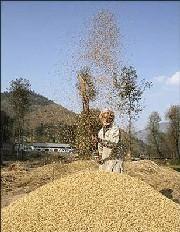 | « Back to article | Print this article |
India and Israel should jointly work to ease agricultural trade regulations and remove barriers, Israel's Agriculture and Rural Development Minister Orit Noked said on Tuesday. "Let us both mobilise ourselves, each one in his respective country, in order to try and ease as much as possible on our businessmen, in opening barriers, easing regulations,...preventing double taxation," said Noked during the interactive session with business delegation, in New Delhi.
"Let us both mobilise ourselves, each one in his respective country, in order to try and ease as much as possible on our businessmen, in opening barriers, easing regulations,...preventing double taxation," said Noked during the interactive session with business delegation, in New Delhi.
As Israeli agricultural technologies help achieve efficiency in farm production with less labour, the minister urged Indian companies to examine these technologies carefully for adoption to Indian conditions.
India can adopt and implement modern agricultural technologies developed by Israeli companies especially in the field of dairy, livestock sector, fruits and vegetables, irrigation equipment and poultry industry, she added.
Addressing Indian businessmen in the interactive session, jointly organised by industry bodies Ficci and PHD chamber, the visiting minister urged Israeli companies to acquaint with the needs of India and accordingly make adjustments to provide suitable agricultural solutions.
Meanwhile Indian Agriculture Ministry official Sanjeev Chopra said, "The way relationship is growing between two countries, agriculture sector is just the beginning. We hope to catch up with Israel in some areas of agriculture".
Despite limited natural resources, Israel has developed agriculture through modern technologies. It has also started exporting as it considers agriculture as business, he said.
Ficci highlighted that India and Israel have potential to cooperate in areas such as fresh and processed food sector, dairy, seeds, water irrigation and specialised green house technology.